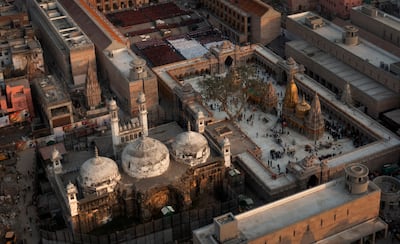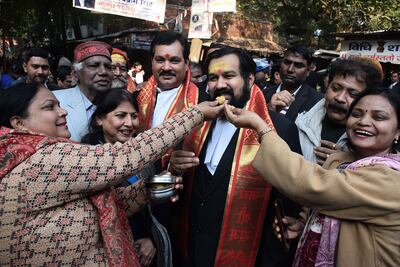Devotees conducted Hindu rituals and offered prayers in the cellar of a 17th-century mosque in northern India on Thursday after a court ordered that they be allowed.
The order was passed a day earlier by the Varanasi district court, which is hearing a petition that Hindus be allowed to offer prayers to “visible and invisible deities” inside the Gyanvapi Mosque complex in the city of Varanasi in Uttar Pradesh state.
Many Hindus claim that the Mughal ruler Aurangzeb demolished a temple to make way for the mosque, which stands next to the 18th-century Kashi Vishwanath temple dedicated to the Hindu deity Shiva.

The Varanasi court on Wednesday ordered that one of the mosque's cellars, which had been sealed, be handed over “to the plaintiff and the priest named by the Kashi Vishwanath Trust Board” and gave the district administration one week to make arrangements.
But the authorities in Uttar Pradesh, which is ruled by Prime Minister Narendra Modi's Hindu nationalist Bharatiya Janata Party, moved swiftly to remove the fencing from the site overnight, enabling devotees to enter the complex.
The district administration held a two-hour-long meeting with top police officers before the prayers were offered and there was a heavy police presence at the mosque as Hindu devotees lined up outside.
Members of the Rashtriya Hindu Dal, a Hindu group, vandalised a sign outside the mosque, pasting “mandir and temple” over “mosque and masjid”.
The prayers started at around 3am but were scheduled to take place five times throughout the day.
“We are very happy that we could offer prayers. We will continue offering prayers every day. Every morning and in the evening. The government has given us this golden opportunity,” Madhav Dutt, priest of Kashi Vishwanath Temple, said.
Hindus were allowed to worship the deities carved on the outer wall of the mosque every day until 1993, but such rituals were restricted to once a year after Hindu nationalists demolished the Babri Masjid, another Mughal-era mosque, in 1992. Four cellars were also sealed amid fears of unrest.
One of the cellars was in the possession of the Vyas family, a family of priests who claimed they conducted religious ceremonies in the basement, called Vyas Ka Tehkhana, before it was sealed.
“There are idols, lotus symbols in the cellar. My family used to offer prayers there. We are very happy that now it has been opened again,” said Jitendra Nath Vyas, a member of the family.
The Anjuman Intezamia Masjid Committee, which manages the mosque, has rejected such claims and sought to challenge the district court's order in the Supreme Court on Thursday.
The top court asked them to file an appeal in the local high court.
“No idol was in the cellar. It is wrong to say that the members of the Vyas family had the cellar. The basement is in the possession of the Anjuman Intezamia Masjid Committee,” said Akhlaque Ahmad, the committee’s lawyer.
“We will approach the Allahabad High Court against the decision. The Hindu side has not placed any evidence that prayers were held before 1993,” he said.

The district court's order came a week after receiving a survey report it had asked the Archaeological Survey of India to prepare to determine whether the Gyanvapi Mosque was “constructed over a pre-existing structure of a Hindu temple”.
The ASI's 839-page reportedly said it found evidence that the mosque was built over a Hindu temple.
The latest development in the case has renewed anxiety among Muslims about a growing number of Hindu claims to mosques allegedly built on the site of demolished temples.
Last month. Mr Modi inaugurated a grand temple dedicated to Lord Ram at the site of a demolished mosque in Ayodhya.
Asaduddin Owaisi, an MP from the All India Majlis-E-Ittehadul Muslimeen, said the Varanasi court's judgment was a violation of the Places of Worship Act.
The law was passed in 1991 to protect contested historical religious sites and mandates that the nature of all places of worship should remain as they were when India gained independence from British rule in 1947.
But the Varanasi court ruled that the Gyanvapi lawsuit was maintainable because the petitioners were demanding only that they be allowed to pray inside the mosque.

